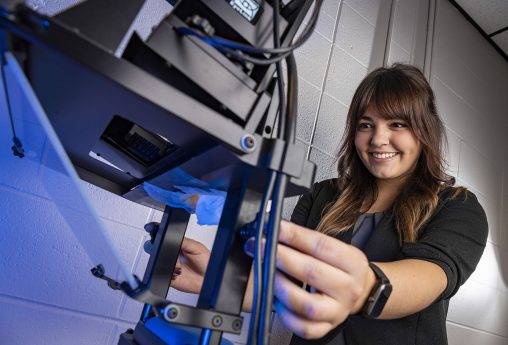
A SMART scholarship will support Sasha Willis’s pursuit of a Ph.D. in human factors and industrial/organizational psychology through the Eye Movement and Motion Psychophysics Lab at Wright State.
There’s smart and then there’s SMART. Nearly all at Wright State University are to some degree the former, but Sasha Willis is the latter.
Willis, who pursuing a Ph.D. in human factors and industrial/organizational psychology at Wright State, received from the Department of Defense a two-year scholarship to complete her doctoral studies. The scholarship is called SMART – Science, Mathematics And Research for Transformation.
The scholarship covers tuition, provides a stipend and secures an internship for two summers at a Department of Defense research facility — in Willis’s case, at Wright-Patterson Air Force Base.
Willis is no stranger to Wright-Patt; she recently wrapped up a contract position at the base. She credits her work experience and performance at the base as well as the progress she’s made at Wright State with landing the scholarship.
Willis is also working in the Department of Psychology’s Eye Movement and Motion Psychophysics Lab, which studies many aspects of human visual capabilities. A broad focus of the lab is to assess the capabilities and limitations of motion perception to understand how the brain processes and interprets visual motion.
“I moved here for that program,” said Willis, who graduated from the psychology program at the University of Central Florida. Willis and her family had moved to Florida from China, where she was born and where her father worked in international business.
“I’m researching how people interact with different technologies, focusing on how people work with and trust robots in a military setting,” Willis said. “I focus on eye tracking with people who use machine learning for making decisions.”
Willis said a SMART scholarship “is difficult to get, especially in my discipline of cognitive sciences. The DOD hires few people in my field — they hire mostly engineers or programmers, so it’s a pretty selective award.”
Her adviser, Scott Watamaniuk, Ph.D., professor of psychology and director of the graduate program in the Department of Psychology, attested to the SMART Scholarship’s uniqueness. The scholarship crosses the disciplines of engineering, physics, chemistry and the category in which his students apply, cognitive, neural and behavioral sciences.
In 2022, 482 scholarships, or 19% of the total number of applications, were awarded across the country, Watamaniuk said. “Of those 482, only 128 were for Ph.D.’s. Further, of those 482, only six were awarded for cognitive, neural and behavioral sciences — so Sasha got one of those six,” he said.
Watamaniuk added, “Sasha is an excellent student. One of the things in the sciences is you have to be curious and be able to do some good problem-solving, and she’s good at all of that. She’s really good at thinking about problems and interpreting that data — and that’s what you need in the sciences.”
“The reason this scholarship is so attractive to me,” Willis said, “is that because of the stipend I can completely focus on my studies without having to get external employment. What I get out of this is that I can complete my degree on time and a lot faster than if I had stayed on as a contractor.”
Also, SMART recipients usually wind up with full-time jobs from their internships.
“Getting these SMART awards reflect very highly on our students and our program,” Watamaniuk said.
Willis is the third student from Watamaniuk’s lab to receive that scholarship.
“It is an acknowledgment that the students we recruit in our Ph.D. program here are top-notch,” he said.
As for how Willis views Wright State: “What I don’t see so much at other schools is the connections Wright State has made with the DOD and specifically Wright-Patt. Wright State has done a great job forging these connections for scholarships and employment opportunities so their students are employable and desirable in the workforce.”
She added, “It’s pretty easy for me to brag about Wright State.”

 Wright State receives $3 million grant to strengthen civic literacy and engagement across Southwest Ohio
Wright State receives $3 million grant to strengthen civic literacy and engagement across Southwest Ohio  Fitness Center renovation brings new equipment and excitement to Wright State’s Campus Recreation
Fitness Center renovation brings new equipment and excitement to Wright State’s Campus Recreation  Wright State University settles civil lawsuit against WSARC, now doing business as Parallax Advanced Research Corporation
Wright State University settles civil lawsuit against WSARC, now doing business as Parallax Advanced Research Corporation  Wright State senior paints a new path through fine arts internship
Wright State senior paints a new path through fine arts internship  Wright State recognizes Nursing Professor Kim Ringo for advancing international student success
Wright State recognizes Nursing Professor Kim Ringo for advancing international student success 